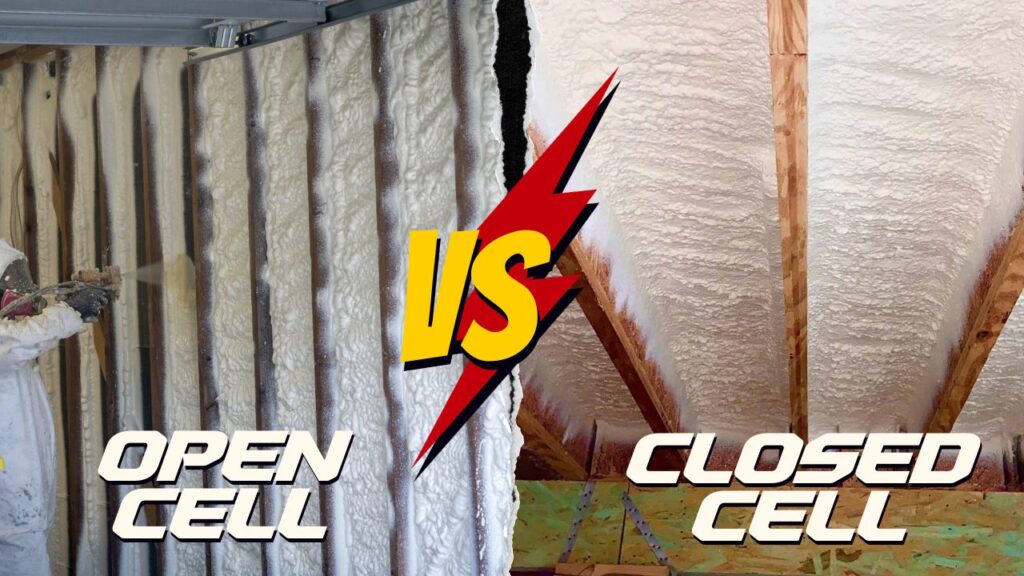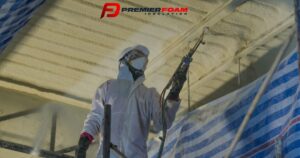When it comes to insulating your home, there are several options. Two popular choices are closed-cell spray foam insulation and open-cell spray foam insulation. Both have advantages and disadvantages, making it crucial to understand their differences. This blog post will help explore the critical features of closed-cell and open-cell spray foam insulation to help you decide on your insulation needs.
Understanding Closed Cell Spray Foam Insulation
Closed Cell Spray Foam Insulation is a dense insulation material known for its exceptional thermal performance. It comprises tiny, closed cells packed tightly together, creating a rigid and durable barrier against heat transfer. This type of insulation is typically applied as a two-component mixture, which expands and hardens after application.
Advantages of Closed Cell Spray Foam Insulation
Here are the benefits of closed-cell spray foam insulation;
High Insulating Value: Closed-cell spray foam has an impressive R-value, which measures its thermal resistance. It provides superior insulation compared to many other materials.
Air and Moisture Barrier: Closed cell insulation acts as an effective air & moisture barrier, preventing drafts & moisture intrusion, which may lead to mold and structural damage.
Structural Support: It adds structural stability to the building due to its rigid nature, enhancing the overall strength of walls and roofs.
Versatility: Closed-cell spray foam can be used in various applications, including walls, ceilings, and crawl spaces.
Energy Efficiency: Its excellent insulating properties contribute to energy savings and lower utility bills.
Understanding Open Cell Spray Foam Insulation
Open-cell spray Foam Insulation is a less dense option compared to closed-cell insulation. It consists of open cells that are softer and more flexible, providing a different set of advantages.
Advantages of Open Cell Spray Foam Insulation
The following are the benefits of open-cell spray foam insulation;
Cost-Effective: Open-cell insulation is typically less expensive than closed-cell insulation, making it an attractive option for budget-conscious homeowners.
Sound Absorption: It has excellent sound-absorbing properties, reducing noise transmission outside and between rooms.
Flexibility: Open-cell spray foam can expand and contract with the building structure, making it less likely to crack or break over time.
Breathability: It allows moisture to pass through, benefitting certain applications where moisture management is crucial.
Eco-Friendly: Open cell insulation is water-blown and contains fewer chemicals, making it a more environmentally friendly option.
Closed Cell vs. Open Cell: Which is Better?
The choice between closed-cell & open-cell spray foam insulation primarily depends on your specific needs and budget. Here are some factors to consider:
Climate: In colder climates, closed cell insulation’s higher R-value and moisture resistance make it a preferred choice. In milder climates, open-cell insulation may be sufficient.
Budget: Closed-cell insulation is generally more expensive than open-cell insulation. Open-cell insulation may be the better choice if cost is a significant factor.
Moisture Control: If you have concerns about moisture infiltration, closed cell insulation’s impermeability is advantageous.
Sound Control: Open cell insulation’s acoustic properties are superior for soundproofing purposes.
Structural Considerations: If your building requires additional structural support, closed cell insulation’s rigidity may be beneficial.
Also read: Spray Foam vs Fiberglass
Hiring a Professional for Open-Cell and Closed-Cell Insulation
Hiring a professional for open-cell and closed-cell insulation offers a multitude of benefits. These skilled experts possess the knowledge and experience to assess your specific insulation needs, ensuring you receive the most efficient and cost-effective solution for your property.
Their precise installation techniques guarantee a seamless, airtight barrier against heat transfer and moisture infiltration, enhancing your home’s energy efficiency and comfort.
Moreover, professionals are equipped with the latest equipment and safety protocols, reducing the risk of potential hazards associated with insulation installation. Ultimately, entrusting the job to a professional saves you time and effort and delivers long-term savings through reduced energy consumption and improved indoor climate control.
Conclusion
There is no one-size-fits-all answer in the debate between closed-cell and open-cell spray foam insulation. Your choice should be based on your requirements, budget, and climate conditions. Both types of insulation offer unique advantages, so it’s essential to consult with a professional insulation contractor to determine the best solution for your home.
Whether you opt for the high R-value and moisture resistance of closed-cell insulation or the cost-effectiveness and sound absorption of open-cell insulation, improving your home’s insulation is a wise investment in energy efficiency and comfort.
If you’re considering installing closed-cell or open-cell spray foam insulation, contact Premier Foam Insulation at (347) 682-2662 for expert advice and professional installation services. Our team of experienced professionals will help you make the right choice for your insulation needs.





